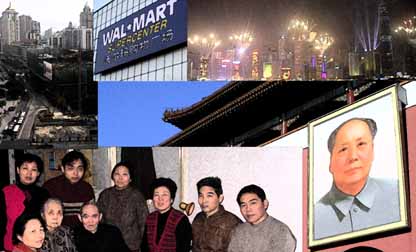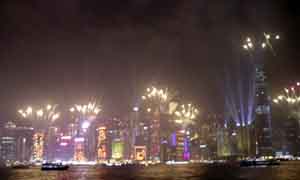 |
Journey
to My Home: Hong Kong and China Rediscovering the Meaning of Labor Activism, Being Chinese and Chinese Nationalism By: Lee Siu Hin |
Part Six: End Notes (April 30, 2004)
 |
| Photo: firework celebration at Hong Kong's Victoria Harbor during Chinese Lunar New Year at January |
It has been three months since I returned from my trip to Hong Kong and China, yet I still have many mixed feelings. few days ago the Bush administration rejected the major U.S. labor unions' request for trade sanctions against China.
It was considered good news in the Chinese media, because it's a victory for China's fight against what we see as racist protectionism from the United States. Cold War-style propaganda against China--given the fact that the U.S. labor unions brought Chinese dissidents to advocate sanctions against China--is considered greatly offensive to Chinese across the world, since most Chinese consider these dissidents no more then traitors and their words have no credibility in Chinese society around the world.
Unless you are Chinese you won't understand that the pain and mistrust after 150 years of western imperialist invasion and colonialism, these last 50 years in China have been the best period in over 200 years. Our fears of being backward and the possibility of imperialist invasion have forced us to build national unity and prosperity at any cost.
The fear of being left behind--both realistic and imaginary--pushes everyone in China to do more then enough. During my trip I read many articles and talked with many people who complain "it only happens in China." Corruption, industrial accidents, and even traffic jams, are considered the fault of the Chinese government. "It wouldn't happen in the U.S.," many people told me. Based on my observations, many of these people are really just ignorant, since many of the things they complain about in China also happen in America. I told my friends that Americans also always complain about their problems and say "it only happens in America!" and we all laugh.
Then, what is the problem with the anti-sweatshop movement?
There's no such thing as an anti-sweatshop movement in Hong Kong because
we all make our living from sweatshop operations. Any Hong Kong-based
sweatshops campaigning against China are most likely western-funded projects
serving Cold War purposes. Their goal is NOT to fight against sweatshops,
but rather to keep them as long as possible.
As a labor activist, I have many mixed feelings from the trip, because American labor activists just do not understand China. I know many major political and labor activists in Hong Kong, and we are not meeting the right people. It's common knowledge in Hong Kong and China that most pro-western/pro-"democracy" right-wing activists in Hong Kong are members of western supported groups, getting U.S. funding and clearly serving U.S./western anti-China interests. Sometime I wonder why U.S. activists travel half the world to come to Hong Kong, only to meet with U.S. front groups.
Sweatshops are a complex socio-political phenomenon. More than simple economic exploitation, it's also a product of the Cold War between east and west. The economies of most U.S.-backed right wing military governments in Central America and the Caribbean, such as Haiti, El Salvador, Panama and Nicaragua, rely on the sweatshop factories invested in and operated by Korean and Taiwanese companies.
It's common knowledge in our community that the corrupt right-wing governments in Central America and the Caribbean rely on investments from Taiwanese companies to open factories to manufacture products to export to the U.S. These countries in turn maintain diplomatic relationships with Taiwan. Central America is the region where Taiwan maintains most of its alliances with countries who will help it to continue its U.S-backed breakaway from China.
Chinese believe that Taiwan is part of China and there's no compromise possible with this issue. Ordinary Chinese are angered by the Taiwanese government's use of economic tools (sweatshops) to keep diplomatic relationships in Central America, and to maintain their renegade government. China in turn also needs to unify Chinese from across the world by supporting their economic needs and their businesses, which in practice means supporting sweatshops.
These comments may sound harsh, but these are the facts we live with everyday.
 |
On the flight to Hong Kong, I remembered saw a Hong Kong-made cartoon: "My Life As McDull," a beautiful fantasy story about a semi-employed single mother who creates a deception to make her 5-years old son--McDull--believe that they are going to the South Indian Ocean for a vacation.
This family trip to China and Hong Kong is a fantasy come true. For the first time in ten years I was finally able to come back to my country, see the great changes in China, rediscover what it means to be Chinese, and meet my grandparents. I hoped this was a happy dream I would never need to wake up from.
Unfortunately, when I arrived at Los Angeles airport and went through immigration under the new US-VISIT system, I had to be fingerprinted and photographed....
After I return from my trip of the dream and back to Los Angeels, I again
return to my work at sweatshops in downtown Los Angeles: hope, disappointment;
more hopes, more disappointment again--but that's what life is. However,
my god mother (in United States) always tells me: never say never, never
give up the hope, "people comes and goes--the true one will always
stays," she says. I think the same for anti-sweatshops and anti-globalization
movements--it mixed with hopes and disappointments, but we need to believe
there'll be a hope and the love at the end, otherwise, there's no reason
why we are doing this.
Still, one of the missing links in understanding the sweatshop struggle is the Hong Kong and overseas Chinese who run sweatshops: most export factories in China, other parts of Asia, Saipan and Central America are owned by Chinese from Hong Kong, Taiwan, the United States and Canada. Without putting the Hong Kong and overseas Chinese owners into the equation, we'll never able to find the faceless workers in China, Indonesia or El Salvador who made the products, the invisible hands that made it happen.
Special thanks to T.S. for editing; and my parents for their financial and logistical supports for the trip, and Li Gang for his traveling supports.